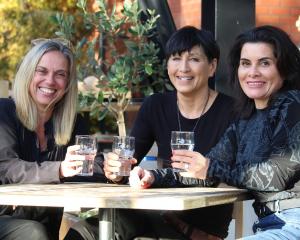A week after the devastating earthquake, some Christchurch residents still have no power and no water.
No showers, no washing machines, no toilets.
Many have abandoned homes in the worst affected eastern suburbs, but there are also people who have nowhere to go or want to stay with their homes or pets.
Those remaining have mainly moved out of creaking homes into tents, garages or caravans in their yards.
In St Helliers Cres, Bexley, portaloos have not yet been supplied.
The nearest is 10 minutes' drive away, along potholed and sand-filled streets.
The nearest working supermarket is a 40-minute drive.
The nearest water supply is 20 minutes away.
Here, those who remain rely on good Samaritans with water and food.
Luckily, there are still plenty of these, and several times a day cars circle the suburb, stopping to drop off supplies such as matches, blankets, water and food.
Yesterday morning, members of the Grace Vineyard Church were delivering food and supplies, dropped off in Brighton by the Rangiora Earthquake Express.
Residents were clearly pleased to see them.
Many cannot get to central provision sites, and by day seven after the quake, rely on such helpers turning up several times a day.
At No 17, Michelle Morris and son Dylan (11) are trying to work out how to start their generator.
Like thousands of others, they left Christchurch after the quake.
They returned on Sunday.
The walls of their home are cracked but they think it is livable.
They have a swimming pool and are using its water - boiled on the barbecue - for everything.
They are not yet sure how they are going to get on without a shower, but plan to dig a hole in the ground out the back for "No twos".
Mrs Morris' cleaning job was all but wiped out.
She was told yesterday it might be three months before the water was back on.
She was praying the bank would give the family a mortgage break, or they had no idea what they would do, she said.
Tony Robinson, at No 23, has stayed put since the quake.
Permanently disabled, he used to be able to get around on crutches, but his motorised scooter is much more stable in the aftershocks.
Not wanting to leave his home for fear of looting, he has coped with the help of family and friends, who have brought him food, a generator and some fuel for it and his four-wheeled motorcycle, which he uses to travel to water stations.
He has a car, but he wants to conserve fuel, and it is easier to get around on the motorcycle anyway.
Everything is rationed.
"It's a bit of a toss-up as to how I use the fuel.
"I need it for the generator, but then if I need to get away quickly, I need the bike to be filled up," he said.
He turned the generator on only when he needed to, mainly at night to watch some television and have some light.
All food was cooked on the barbecue.
At this stage, he was using precious water supplies to fill the toilet cistern.
He flushes when absolutely necessary.
But the family at No 33 St Helliers Cres has been the most resourceful.
The Creedon children, aged 18, 13 and 11, refused to sleep inside, so the family of five has moved into the garage.
Step-dad Frank Ratima has built a long-drop.
A sheet screens bunk beds from a makeshift lounge, kitchen and bathroom.
An open-fire barbecue with three cooking racks, and with walls and a chimney, has been fashioned from a metal bookcase and corrugated iron.
The family travels to mother Gaylene's sister's house twice a week for showers and to do a load of washing.
Eleven-year-old Josh says living without water and power is really hard, but the thought of having such a cool long-drop cheers him up somewhat.
They have a generator which they share with neighbours, but use it only when absolutely necessary.
Neither they nor Mr Robinson have a refrigerator going because they want to save the generator.
They rely on food coming around regularly.
"We stay here because we don't want to leave our animals.
"It's pretty good really. I think it's cosy.
"It's just like camping out," Mrs Creedon said.






